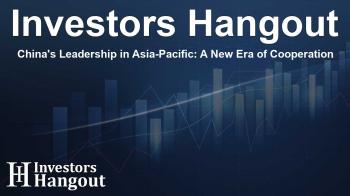China's Leadership in Asia-Pacific: A New Era of Cooperation

China's Role in Shaping Asia-Pacific Relations
Chinese President Xi Jinping has been actively engaging with leaders from the Asia-Pacific region, showcasing China's commitment to fostering stability and economic prosperity. The recent series of bilateral meetings underscores Xi's strategic vision for collaboration and mutual growth among neighboring nations.
Strengthening Ties with Key Leaders
During these crucial discussions, President Xi interacted with various heads of state, emphasizing the importance of cooperation. Notably, he met with leaders such as Thailand's Prime Minister Paetongtarn Shinawatra and Singapore's Prime Minister Lawrence Wong. These conversations highlighted China's intention to enhance shared development goals and forge stronger partnerships.
Focus on Sustainable Development
In addressing the meeting with Thailand's leader, Xi expressed China's readiness to work closely to deepen mutual understanding and collaboration across various sectors, including governance and economic development. This relationship aims at modernizing both nations while fostering a community with a shared future.
Shared Aspirations for Growth
Xi's meeting with Prime Minister Wong also affirmed China's dedication to mutual progress, signaling a strong commitment to high-quality development and a modernized partnership. These discussions signify a mutual aspiration for both nations to advance harmoniously on the development path.
Building Strong Partnerships Across the Region
Xi's dialogue with South Korea's President Yoon Suk-yeol aligned with the vision of steady development of the strategic cooperative partnership between the two countries. Such relations are essential for regional stability, considering the complex political climate in the Asia-Pacific.
Expanding Economic Cooperation
With the Chilean President Gabriel Boric, discussions revolved around increasing bilateral cooperation, focusing on sustainable practices and elevating trade policies. This meeting stands as a testament to China's desire to broaden its economic engagement throughout the Asia-Pacific, highlighting a shift toward deeper integration.
Acknowledging Regional Dynamics
Meetings with New Zealand and Japanese leaders reinforced the cooperative spirit that characterizes the current landscape. Xi's indication towards mutual respect and cooperation with New Zealand's Prime Minister Christopher Luxon aimed at portraying an era of partnership rather than confrontation. This sentiment echoed during discussions with Japanese Prime Minister Shigeru Ishiba, where both leaders recognized the importance of communication to steer China-Japan relations toward stability.
The Impact of These Meetings
The series of meetings indicates a growing recognition of China's role across the Asia-Pacific. Experts note that these dialogues are essential for addressing uncertainties within regional political and economic orders. The collaborative spirit displayed among the leaders reflects a shared commitment to common interests, aiming for sustained prosperity.
China's Influence in the Asia-Pacific
As China bolsters its relationships with these key nations, it is also seen as a counterbalance to existing tensions within the region. The partnerships formed are likely a strategic response to the evolving dynamics and apprehensions regarding other dominant powers. By engaging with allies and partners, the goal is to foster stability through stronger bilateral ties.
Prospects for the Future
The high-level discussions underline that enhancing relationships with China is viewed as a means to secure individual countries' long-term interests. By working closely together, these countries aim to mitigate uncertainties, embrace economic opportunities, and lay the groundwork for a cohesive future within the Asia-Pacific.
Frequently Asked Questions
What was the purpose of Xi Jinping's recent meetings?
The meetings aimed to strengthen ties with various Asia-Pacific leaders, promoting regional stability and economic cooperation.
Which leaders did Xi Jinping meet during these discussions?
He met with leaders from Thailand, Singapore, South Korea, Chile, New Zealand, and Japan, highlighting the importance of collaboration.
How does China's engagement impact regional stability?
China's engagement is seen as fostering cooperation, which is essential for addressing uncertainties in the Asia-Pacific's political and economic landscape.
What are the future prospects of these partnerships?
The future looks promising, with a focus on synergy, shared interests, and the potential for sustainable economic growth among the nations involved.
Why is this engagement significant for these countries?
This engagement is significant as it allows countries to mitigate risks and enhance their overall stability in a rapidly changing geopolitical environment.
About Investors Hangout
Investors Hangout is a leading online stock forum for financial discussion and learning, offering a wide range of free tools and resources. It draws in traders of all levels, who exchange market knowledge, investigate trading tactics, and keep an eye on industry developments in real time. Featuring financial articles, stock message boards, quotes, charts, company profiles, and live news updates. Through cooperative learning and a wealth of informational resources, it helps users from novices creating their first portfolios to experts honing their techniques. Join Investors Hangout today: https://investorshangout.com/
Disclaimer: The content of this article is solely for general informational purposes only; it does not represent legal, financial, or investment advice. Investors Hangout does not offer financial advice; the author is not a licensed financial advisor. Consult a qualified advisor before making any financial or investment decisions based on this article. The author's interpretation of publicly available data shapes the opinions presented here; as a result, they should not be taken as advice to purchase, sell, or hold any securities mentioned or any other investments. The author does not guarantee the accuracy, completeness, or timeliness of any material, providing it "as is." Information and market conditions may change; past performance is not indicative of future outcomes. If any of the material offered here is inaccurate, please contact us for corrections.
